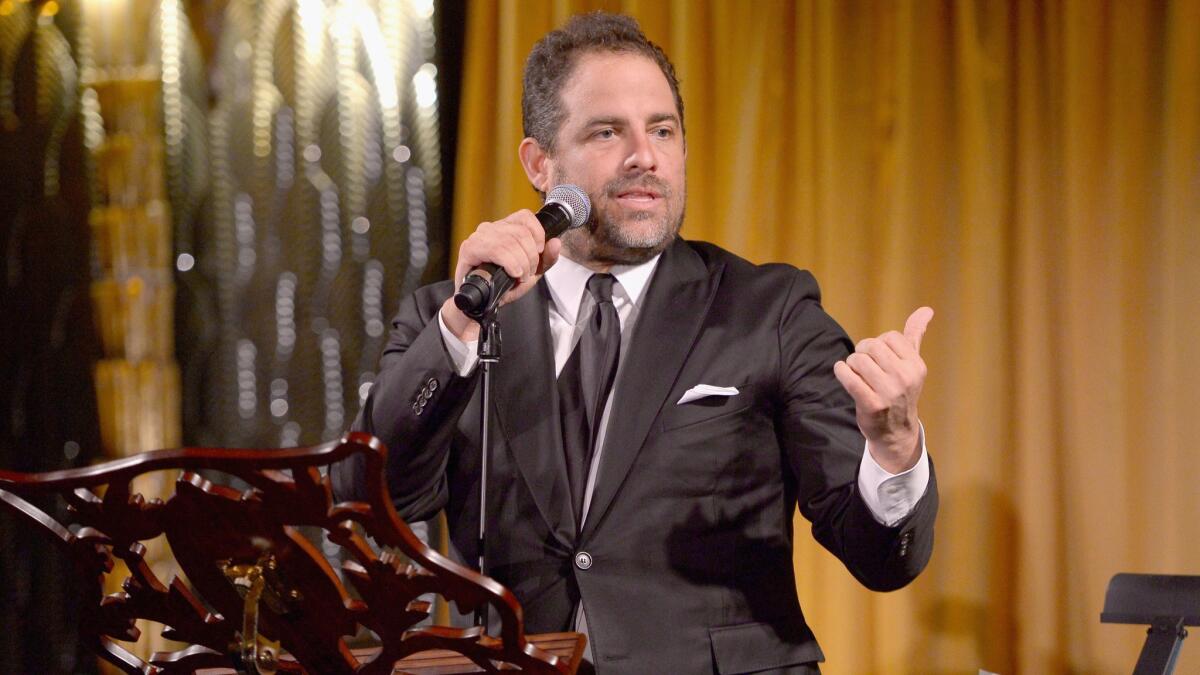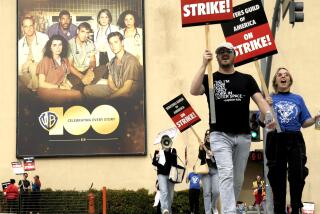Warner Bros. won’t renew financing deal with Brett Ratner, cutting remaining ties with filmmaker

- Share via
Warner Bros. will not renew its $450-million co-financing agreement with Brett Ratner’s film funding company, cutting its remaining ties with the embattled director, who has been accused of sexual misconduct or assault by several women.
The Burbank studio’s deal with RatPac-Dune Entertainment, which covered the financing of up to 75 movies, is drawing to a close with the release of the Dwayne Johnson-starring action film “Rampage” on Thursday.
A spokesman for Warner Bros. confirmed that the studio would no longer have a financing agreement or other business deal with Ratner after the release of “Rampage,” declining to elaborate. The co-financing pact or slate deal, which was struck in 2013, had been scheduled to expire this spring.
The Times first reported Nov. 1 that six women, including actresses Olivia Munn and Natasha Henstridge, had accused Ratner of a range of acts of sexual misconduct or assault, including harassment, inappropriate touching and forced oral sex. Hours after the story’s publication, Warner Bros. began separating itself from the filmmaker, opting to not renew its production deal with another of his companies, RatPac Entertainment.
A few weeks after The Times’ initial report, a subsequent story on Ratner detailed alleged incidents involving five other women. Ratner, 49, known for directing, producing and financing hits such as “Rush Hour,” “Horrible Bosses” and “The Revenant,” has “categorically” denied the accounts of each of the women.
Ratner did not respond to a request for comment sent to his attorney.
For years, Ratner was a key part of Warner Bros.’ filmmaking apparatus.
Along with Australian billionaire James Packer and now-Treasury Secretary Steven Mnuchin, Ratner inked the RatPac-Dune co-financing deal with the studio after it lost longtime partner Legendary Entertainment. The studio’s deal with RatPac-Dune, which was created by RatPac Entertainment, and Mnuchin’s Dune Entertainment, covered roughly 25% of the costs of the movies in which it invested. Their venture was one of Warner Bros.’ most important financial partnerships, helping fund hit films including “Gravity” and “Wonder Woman.”
But RatPac-Dune’s investment in the Warner Bros. slate had mixed results. As with similar deals at other studios, RatPac-Dune was not able to invest in certain high-profile projects, such as the lucrative “Fantastic Beasts and Where to Find Them” movie series. Also, RatPac-Dune’s money has been used to pay for flops, including “Jupiter Ascending,” which grossed $184 million worldwide but cost an estimated $175 million to produce and tens of millions of dollars more to market.
With the end of the Warner Bros. deal, it is unclear what will become of RatPac-Dune. Mnuchin unloaded his stake in the company after he was confirmed as Treasury secretary in February 2017, and Packer sold his share a few months later to Access Industries, the investment company of billionaire Len Blavatnik.
Access, which also owns record label giant Warner Music Group, did not respond to a request for comment.
Time Warner Inc.-owned Warner Bros. could replace RatPac-Dune with one of Hollywood’s many deep-pocketed financiers. The studio already has co-financing and distribution deals with other companies including Village Roadshow Pictures and Alcon Entertainment. But the potential purchase of Time Warner by AT&T could diminish the need for additional financing partners at the studio. (The $85-billion deal is up in the air after the U.S. Department of Justice sued to block it; a trial is now underway in Washington.)
Ratner hadn’t only been financing films for Warner Bros. — he was also producing them via RatPac Entertainment. In 2014, Warner Bros. signed the filmmaker’s company to a first-look production deal, meaning the studio got first dibs to fund and release its movies. The company, which Ratner co-founded with Packer, was housed in offices on the Warner Bros. lot that were formerly occupied by Frank Sinatra. But after Ratner’s alleged misconduct came to light and Warner Bros. opted to not renew its deal with RatPac Entertainment, the filmmaker lost his office in the storied space.
Ratner said in a Nov. 1 statement that he was “choosing to personally step away from all Warner Bros.-related activities. I don’t want to have any possible negative impact to the studio until these personal issues are resolved.”
There has been other fallout for Ratner.
In November, the filmmaker was removed from Warner Bros.’ adaptation of Donna Tartt’s Pulitzer Prize-winning novel, “The Goldfinch,” which he was in line to produce. Also, Playboy Enterprises halted plans to team with Ratner to produce a biopic about the colorful life of the company’s late founder, Hugh Hefner.
And spirits company Diageo said in the fall that it had discontinued the filmmaker’s whiskey brand, the Hilhaven Lodge, following the spate of sexual misconduct allegations. Launched in 2016, the whiskey — named for Ratner’s Beverly Hills estate — was the product of a licensing and marketing services agreement between Diageo and Ratner, who owns the Hilhaven Lodge trademark.
While remaining out of the public eye since the allegations emerged, Ratner has chosen to fight one of his accusers in federal court, suing her for libel in Hawaii last fall.
A judge there is now considering whether his lawsuit, over a Facebook post in which Melanie Kohler alleged she was raped by Ratner 12 years earlier, violates a California law against suing to silence one’s critics. Judge Helen Gillmor ruled last week that Ratner’s attorneys can’t depose the woman but did allow them to ask Kohler for written responses to questions and to request any documentary evidence she has that Ratner raped her. He has denied Kohler’s allegations.
Gillmor ruled that Ratner can ask Kohler for information “about the details of the alleged rape, where it supposedly occurred, precisely when it purportedly occurred, what allegedly happened before and after, who was present for the events before and after the alleged rape, when and to whom she told about the alleged incident.”
The judge also permitted Ratner to request correspondence between Kohler and media organizations including The Times and ABC’s “Good Morning America,” which his attorneys argued would show inconsistencies in her story.
Times staff writer Ryan Faughnder contributed to this report.
[email protected] | @DanielNMiller
More to Read
Inside the business of entertainment
The Wide Shot brings you news, analysis and insights on everything from streaming wars to production — and what it all means for the future.
You may occasionally receive promotional content from the Los Angeles Times.












